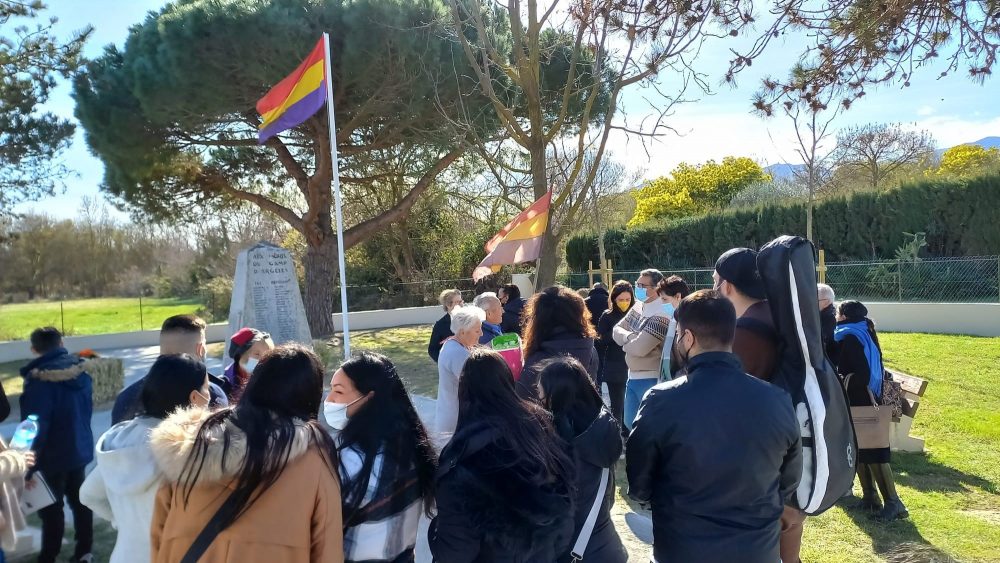On February 5, 2022 a Spanish organisation FAGiC organized the commemoration to remember the Roma victims during the Holocaust in the framework of the International Holocaust Remembrance Day in Argelès-sur-Mer.
For the first time the young Roma organised the local commemoration outside the Catalonia and Spain. The commemoration was not only to remember and pay tribute to the Roma killed during the Holocaust, it was also a visit to the Memorial of the Argelès-sur-Mer Camp (France) to learn about what happened there to Roma, Spanish Roma and Spanish Republicans as a part of our history, because it is unknown and it is not part of the national memory.

History of the Camp
The Camp in Argelès-sur-Mer was the first one to be established in France. It was set up specifically for the Spanish Republicans who were crossing the frontier to escape for Franco repression in January 1939. But after the occupation of France by Germany an order was issued to intern all the Nomads (term used by French authorities to name/label the Roma (Gypsies)). In October 1940 the camp number 2 was established – the Camp for the Nomads – within the first camp. The majority of the Roma interned here were French, however, there were also Spanish and some from the Eastern Europe.
Camp was eventually closed in 1942. It was located closely to the sea and military required free access to the beaches. The majority of the Roma were transferred to camps in Rivesaltes, Barcarès and Saliers. On November 25, 1942, the last 299 Roma were transferred.
Within the 2 years of operation of the Camp of the Nomads, a number of prisoners died. Many victims were children. They suffered due to the bad conditions and the cold. The total number of Roma who died in the Camp is still unknown. The same goes for the number of Spanish Roma interned in the Camp. Not all were were labelled as Nomad. Many of them were labelled as “Republican”.

Commemoration at the Memorial
At the Memorial, Gregory Turban, a researcher on the Nomads Camp, and his colleague Olga explained the history of the camp and moreover the details about the Camp of the Nomads. At the end of the visit, Olga shared the experiences from several Roma testimonies. One of them was a testimony of a 10 years old Roma girl about her life in the camp, what was very emotional moment.
The visit had also another dimension. FAGiC and the Memorial established some kind of cooperation/collaboration agreement to try to identify the Spanish Roma by the surnames.
Later the group moved to the “Cimintieres des Spagnols” (Cemetery of the Spaniards) to commemorate the prisoner and victims. At the Cemetery we were expected by 5 representatives from the FFREEE – Fils et Filles de Républicains Espagnols et Enfants de l’Exode Association (Sons and Daughters of the Spanish Republicans and Children from the Exodus) who came to join us in the commemoration.
The cemetery is located at the place of the mass graves are and it is a place of memory for the descendants of the Spanish Republicans. We greatly appreciated that they had come on Saturday and supported us in our local commemoration.

The commemoration was commenced with a welcome word by Paco Vargas, young Roma and worker of FAGiC. In his speech he reminded the youngsters why we were here and to introduced the representatives of FFREEE. The representatives of FFREEE shared their experiences or experiences of their their families in order to have a “common memory” in the place.
It was followed by a speech from Israel Mercader, young Roma who is studying History. He spoke about the importance of paying tribute to the victims and survivors of the Holocaust and the importance of commemorating and remembering and the role of youngsters in keeping alive the memory of the Roma:
“We, Roma, are different in each country. But what we have in common in our history, is a history of discrimination, persecution and genocide. This is why it is important to commemorate and pay tribute to our People. We, the youngsters, have the obligation to keep alive the memory of our people.”

Quotes/statements from youngsters
Antonio Cruz (Yoyo):
“Es muy importante este tipo de actos porque ayuda a generar espacios para hablar de temas que normalmente no se hablan. Estos actos van más allá de la historia, también genera debates sobre identidad con otros jóvenes. Cosas de las que no se hablan el día a día, pero que son importantes como Pueblo”.
“This type of event is very important because it creates spaces to talk about issues that are not normally discussed. These acts go beyond history; they also generate debates about identity with other young people. Things that are not talked about on a daily basis, but that are important as a Community.”
Juanjo Vargas Barrull:
“Estoy muy contento de haber participado. Es la primera vez que participo en un evento de este tipo. No es lo mismo aprender de libros que vivirlo en primera persona. Me ha impactado mucho ver el museo, verlo y vivirlo en primera persona. La lectura de los testimonios en el museo me emocionado y conmovido mucho”
I am very happy to have participated. It is the first time that I participate in an event of this type. Learning from books is not the same as living it in the first person. The musem is impressive and I was happy to see it and experience it in the first person. The reading of the Roma testimonies in the museum moved me a lot.

The project is funded by the EVZ Foundation and the Federal Foreign Office as part of the program YOUNG PEOPLE remember.



